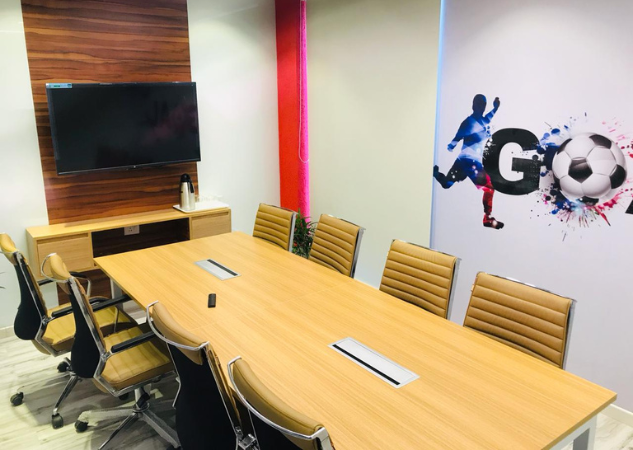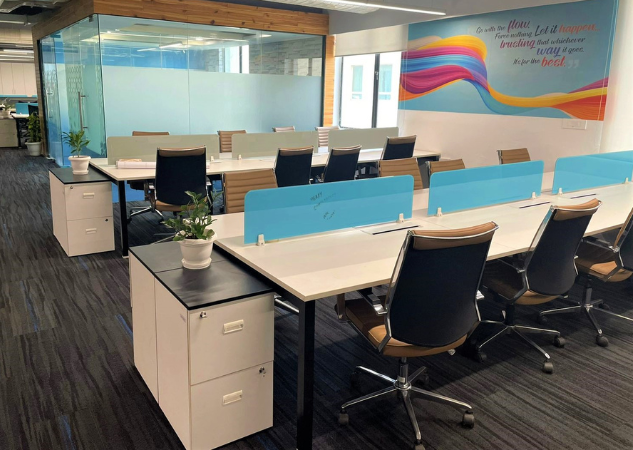As we navigate through 2024, the landscape of Human Resources (HR) continues to evolve at a rapid pace. From AI integration to a stronger focus on employee well-being, the top HR trends are redefining how organizations attract, retain, and manage talent. HR professionals must stay ahead of these changes to effectively manage and engage their workforce. In this blog, you will learn about the top 10 HR trends that are shaping the industry this year.
💡 Are you looking for Coworking space in Gurgaon, Noida or Delhi? We are just a call away.
Call Now: 08999 828282
Top 10 HR Trends that Matter Most
- Emphasis on Employee Experience
- Remote and Hybrid Work Models
- AI and Automation in HR
- Diversity, Equity, and Inclusion (DEI)
- Mental Health and Well-being
- Skills Development and Continuous Learning
- Agile HR Practices
- Data-Driven HR
- Employer Branding
- Ethical AI and Data Privacy

1. Emphasis on Employee Experience
The focus on employee experience (EX) is paramount in 2024. Companies are prioritizing holistic approaches to enhance EX, from recruitment to retirement. This involves creating a positive work environment, offering flexible work options, and ensuring that employees feel valued and engaged.
2. Remote and Hybrid Work Models
Remote and hybrid work models remain a significant trend. Companies are refining their policies to balance remote and in-office work, ensuring productivity and employee satisfaction. This shift requires robust digital infrastructure and a focus on maintaining company culture in a dispersed work environment.
3. AI and Automation in HR
Artificial intelligence (AI) and automation are revolutionizing HR processes. From recruiting and onboarding to performance management and employee engagement, AI-driven tools are enhancing efficiency and accuracy. HR professionals are leveraging AI to make data-driven decisions and personalize employee experiences.
Also Read: The Role of HR in Mental Health and Well-being at Work
4. Diversity, Equity, and Inclusion (DEI)
DEI continues to be a critical focus area. Organizations are implementing comprehensive DEI strategies to foster an inclusive workplace culture. This includes training programs, equitable hiring practices, and policies that promote diversity at all levels of the organization.
5. Mental Health and Well-being
Employee well-being, particularly mental health, is a top priority. Companies are investing in mental health resources, providing access to counseling, and promoting work-life balance. Well-being programs are tailored to address the diverse needs of the workforce, recognizing the impact of stress and burnout.
6. Skills Development and Continuous Learning
The rapid pace of technological advancement requires a focus on continuous learning. Organizations are investing in upskilling and reskilling initiatives to ensure their workforce remains competitive. Learning and development programs are being integrated into the employee lifecycle, promoting a culture of continuous improvement.
7. Agile HR Practices
Agile methodologies are being adopted in HR to enhance flexibility and responsiveness. Agile HR practices involve iterative processes, cross-functional teams, and a focus on delivering value quickly. This approach enables HR to adapt to changing business needs and drive innovation.
8. Data-Driven HR
Data analytics is becoming integral to HR decision-making. HR professionals are utilizing data to gain insights into employee behavior, predict trends, and measure the effectiveness of HR initiatives. Data-driven strategies enable more informed decisions and a better understanding of the workforce.
💡 SMBs looking for HR, Marketing, Technology and Funding solutions for their business.
Call Hello Jarvis 994 8000 800
9. Employer Branding
Employer branding is essential for attracting and retaining top talent. Companies are focusing on building a strong employer brand that reflects their values, culture, and commitment to employees. This involves leveraging social media, creating compelling employee value propositions, and showcasing success stories.
10. Ethical AI and Data Privacy
As the use of AI and data analytics grows, so does the importance of ethical considerations and data privacy. Organizations are developing policies to ensure the ethical use of AI in HR processes and safeguarding employee data. Transparency and accountability are key to maintaining trust.
To conclude, by staying abreast of these trends, HR professionals can effectively navigate the challenges and opportunities that lie ahead. Emphasizing employee experience, leveraging technology, and fostering an inclusive and agile workplace will be crucial for organizations aiming to thrive in the future. Choose The Office Pass (TOP) in Delhi and NCR as your co-working space partner and enjoy availing all the latest state-of-the-art amenities required to run a smooth business. Contact us for more details at 08999 828282.
FREQUENTLY ASKED QUESTIONS (FAQS):
Question: What are the top HR trends for 2024?
Answer: The top HR trends for 2024 include hybrid work models, employee well-being initiatives, use of AI in HR processes, emphasis on diversity and inclusion, continuous learning and development, data-driven HR decisions, focus on employee experience, gig economy integration, leadership development, and enhanced employee benefits.
Question: How is hybrid work impacting HR practices?
Answer: Hybrid work models are changing HR practices by requiring new policies for remote work, implementing technology for virtual collaboration, and developing strategies to maintain company culture and employee engagement regardless of location.
Question: Why is employee well-being a major trend in 2024?
Answer: Employee well-being is a major trend because companies recognise the importance of mental and physical health for productivity and retention. This includes initiatives like mental health support, flexible work hours, and wellness programs.
Question: What steps are companies taking to improve diversity and inclusion?
Answer: Companies are taking the following steps to improve their diversity and inclusion:
- Implementing unbiased recruitment practices
- Providing diversity training, setting diversity goals
- Creating inclusive workplace policies
Question: What is continuous learning and why is it important?
Answer: Continuous learning refers to ongoing education and skills development for employees. It is important because it helps employees stay updated with industry trends, improves job performance, and enhances career growth.
Question: What new employee benefits are becoming popular in 2024?
Answer: New employee benefits in 2024 include expanded mental health services, wellness programs, financial wellness support, flexible working arrangements, and benefits tailored to remote workers, such as home office stipends.
Question: How is AI being used in HR processes?
Answer: AI is being used in HR for tasks such as recruitment, where it can screen resumes and schedule interviews, in employee engagement through chatbots, and in performance management by analyzing data to provide insights.
Question: How does data-driven decision-making benefit HR?
Answer: Data-driven decision-making helps HR by providing insights from employee data, which can improve hiring practices, predict turnover, enhance employee engagement, and tailor development programs to individual needs.
Question: What is the focus on employee experience about?
Answer: The focus on employee experience involves creating a positive work environment that meets employees’ needs and expectations, from onboarding to exit. It aims to boost satisfaction, productivity, and retention.
Question: How is the gig economy influencing HR trends?
Answer: The gig economy is influencing HR trends by increasing the need for flexible employment arrangements, creating new types of contracts, and requiring HR to manage a more diverse workforce of full-time and gig workers.








